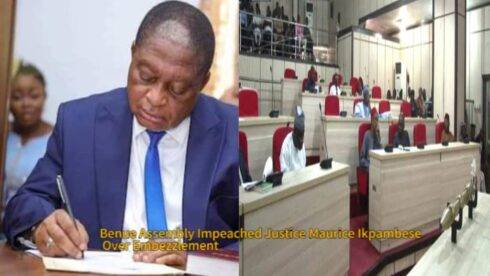Chief Judge Justice Maurice Ikpambese faced multiple allegations, including the misappropriation and mismanagement of the Benue State judiciary’s budgetary allocations. He was accused of engaging with politicians and political officeholders to secure favorable judicial outcomes, thereby compromising the integrity of the judiciary. Additionally, he was implicated in inciting industrial actions against the state executive and was alleged to have been involved in acts of bribery, corruption, and undue favoritism by insisting on appointing cronies to unmerited positions.
One significant charge was his alleged abuse of office by issuing a directive to overturn the Benue State electoral law, which had been duly passed by the assembly and assented to by the governor. This action was perceived as a direct affront to the legislative authority of the state and raised concerns about the separation of powers.
Legislative Proceedings and Decision
The decision to remove Justice Maurice Ikpambese was precipitated by a letter from Governor Hyacinth Alia, presented during a legislative session. The letter detailed the allegations against the Chief Judge and urged the assembly to take appropriate action. During the session, 23 out of the 31 lawmakers voted in favor of his removal, reflecting a significant majority. The Speaker of the assembly subsequently directed the immediate swearing-in of the next-in-line in the state judicial hierarchy as the acting Chief Judge.
This legislative action underscores the assembly’s commitment to upholding the integrity of the state’s judicial system and ensuring that public officials are held accountable for their actions.
Reactions from the Nigerian Bar Association
The Nigerian Bar Association (NBA) has expressed strong disapproval of the assembly’s decision, describing it as a “brazen assault on the Constitution.” The NBA emphasized that the removal of a judicial officer, especially one occupying the esteemed position of Chief Judge, must adhere strictly to due process as outlined in the Constitution. They highlighted that any deviation from this process undermines the rule of law and poses a significant threat to democracy.
The NBA further reminded all arms of government that respect for constitutional provisions is mandatory and that upholding the rule of law is the bedrock of a just and equitable society.
Legal and Constitutional Implications
According to the 1999 Constitution, the process for removing a state Chief Judge involves a recommendation from the National Judicial Council (NJC) following a thorough investigation. The NBA pointed out that the Benue State House of Assembly’s action bypassed this constitutionally mandated procedure, rendering the removal unconstitutional, null, and void. They stressed that the absence of an investigation and recommendation from the NJC undermines the foundational principles of judicial independence and the separation of powers.
This situation raises critical questions about the adherence to constitutional protocols and the potential overreach of legislative powers in judicial matters.
Civil Society and Public Response
Civil society organizations have also weighed in on the matter. Some activists have previously sought judicial intervention to compel the state government to investigate allegations against Chief Judge Justice Maurice Ikpambese. For instance, Optimum Media Limited filed a suit seeking an order of mandamus to compel the Executive Governor and the State House of Assembly to investigate the Chief Judge over allegations of judicial misconduct and financial mismanagement.
These actions reflect a broader concern among civil society groups about accountability and transparency within the state’s judiciary.
Next Steps and Potential Outcomes
In light of the assembly’s decision, the Speaker has directed that the complaint against Justice Maurice Ikpambese be forwarded to the National Judicial Council for an independent and transparent investigation. This move aims to ensure that due process is followed and that the principles of justice and fairness are upheld.
The outcome of the NJC’s investigation will be pivotal in determining the future of Justice Ikpambese’s career and could set a precedent for how similar cases are handled in the future.
This unfolding situation in Benue State highlights the delicate balance between the legislative and judicial arms of government and underscores the importance of adhering to constitutional provisions to maintain the rule of law.
Table of Contents
Discover more from OGM News NG
Subscribe to get the latest posts sent to your email.














